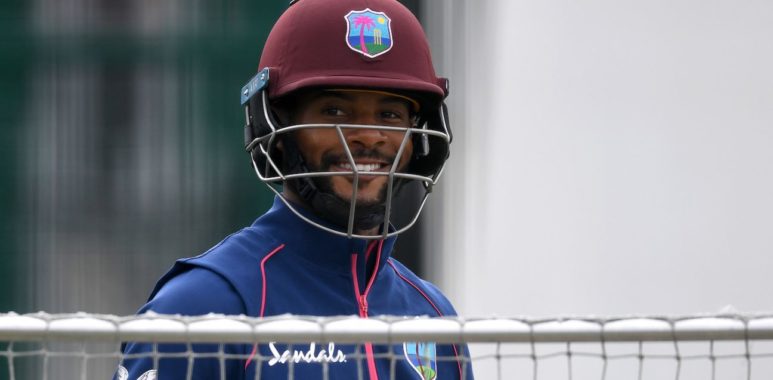
Why Shai Hope’s Headingley opus may not sustain him much longer
When Shai Hope plays against England, one word comes up more than any other: Headingley. By and large, Hope’s Test career is discussed in terms of one match, in which his twin hundreds led West Indies to a memorable win in 2017. But rather than a springboard, that performance has come to feel like a high-water mark: more than one sixth of his career runs came in that match, and since then his average has been a meagre 24.77.
In his last 34 innings, Hope has made two half-centuries. In most Test teams, that would be enough for him to be dropped, but West Indies have rarely had much in the way of competition for places in the top or middle order: across the last three domestic first-class seasons, the only players with over 1000 runs batting in the top four with an average above 40 are the recently-recalled Jermaine Blackwood and 38-year-old Devon Smith.
But heading into the second Test against England, things are different. Most of the batsmen performed admirably at Southampton, in the knowledge that Shimron Hetmyer and Darren Bravo – both of whom opted out of this bio-secure tour – will be after their places in West Indies’ next series.
Jason Holder has hinted that the ‘engine room’ of him and Shane Dowrich may move up a spot each from No. 7 and 8 at some point in the near future, while Joshua Da Silva did his best to bang the door down with a strong showing in the warm-up matches. So after years of security, the man with the question mark looming over his spot is now Hope.
In his pre-match press conference, Holder was reluctant to say whether Hope was under pressure for his spot in the long term. “Going into a Test series you want to give a player as much confidence as you possibly can,” he said. “I don’t look at whether you want to drop and select somebody else.
“You’ve got a core group of guys which you give every added confidence and boost to in order for them to go out there and perform. The great thing about this side is that we’ve been together now for a while. One or two players have come in and one or two players have fallen away, but more or less the nucleus of the squad has been the same. All I really want to do is keep encouraging our guys.”
ALSO READ: Denly, Anderson, Wood out as England ring changes
But with a lack of Test form to go off, it was instructive that Holder again went back to Headingley and his ODI record to talk Hope up.
“Shai is a quality player,” he said. “We’ve seen that particularly the last time he came here in England and then obviously his one-day form has been really good. I’ve got all confidence that Shai Hope will deliver, he just needs to get himself in, get himself going, and he’s going to go big for us.”
Hope himself suggested at the start of this tour that his problems had been “more of a mental thing”, but it is difficult to ignore the technical tweaks that he has made in the last three years.
He has made a number of small adjustments since the 2017 tour, and in particular seems to have developed a weakness against length balls in the off-stump channel – one that batsmen can ill afford against the moving ball in England. In his Headingley epic, he took guard on off stump, with his back leg moving slightly towards the leg side in his trigger movement. The risk was that he would fall across his stumps, making him particularly vulnerable to the nip-backer and turning him into an lbw candidate.
Since then, he has opened up somewhat, shifting his guard across to middle or even middle-and-leg. Theoretically, that should have opened up scoring options on the off side, with his cover drive in particular. In practice, his intent has not particularly changed, and he has largely been out either caught behind or in the slips, or clean bowled by out-and-out fast bowlers.
Against seamers in the last two-and-a-half years, Hope has been dismissed once by a short ball, but his other 15 dismissals have been to length (nine) or back-of-a-length (six) deliveries, against which his averages are 11.66 and 9.33 respectively. In addition, the majority of his dismissals against seamers have been while defending or leaving alone; you might think that his problems have come from being unable to put his elegant drives away, but instead it is his defensive batting that has let him down.
It is instructive to look at the difference between Hope’s approach in Tests and ODIs, not least because of the fact no player has a bigger drop-off from their ODI average to their Test averages since the start of 2018; in his case, 61.02 and 19.51 respectively.
And there are technical changes too in how he approaches different formats. In West Indies’ ODI series against Sri Lanka earlier this year, Hope had a relatively high backlift, allowing him to snap through the ball and attack, but in the first Test at the Ageas Bowl it appeared to be significantly lower.
He has moved back towards the off side slightly in the past 18 months, but whereas he once triggered slightly moments before the bowler’s release, he was very still until the ball had come out of the hand last week. That, along with his tendency to bat outside his crease, proved his undoing in the second innings, when Mark Wood’s in-dipper burst through him as he was late on a loose drive.
But whether his issues are technical or mental, the upshot is that Hope heads into the second Test of this series under pressure in a way he hasn’t been before. With competition for batting spots stronger than it has been for years, West Indies no longer need to carry an underperforming batsman like they have in the recent past. The onus, then, is on Hope to shake that tag.

